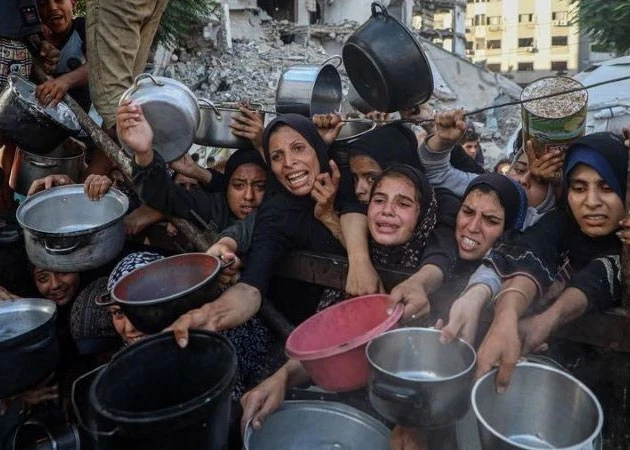Gaza in dire situation: Urgent global action needed
The dire situation in Gaza was one of the main topics at the international conference on the Israel – Palestine conflict held in New York (the US), gathering ministers from over 100 countries.
 |
| Palestinians await free food distribution at a centre in Gaza City on July 14, 2025. (Photo: Xinhua) |
Famine is tightening its grip on Gaza, demanding urgent international action to put an end to the suffering endured by the population.
The conference took place in the context of a serious warning from the World Health Organization (WHO), which reported alarming levels of malnutrition in the Gaza Strip and condemned the obstruction of aid as a direct cause of rising deaths.
The WHO stated that the malnutrition crisis in Gaza is hapenning dangerously, as evidenced by the sharp rise in fatalities in July. Most victims were brought to health facilities already dead or died shortly after arrival, with clear signs of severe malnutrition.
According to the WHO, this crisis is entirely preventable. However, large-scale obstruction or delay in the delivery of food, medical and humanitarian assistance has cost many lives.
Currently, nearly 470,000 people in Gaza are experiencing famine, with around 90,000 women and children requiring specialised nutritional treatment. Nearly 20% of children under the age of five in Gaza suffer from acute malnutrition. In Khan Yunis and central Gaza, these rates have doubled in less than a month.
Amid mounting international pressure, on July 27, Israel began implementing a limited “humanitarian pause” in its military operations to facilitate the United Nations and international organisations in delivering aid and conducting airdrops of food across Gaza. However, the WHO called for sustained efforts to significantly increase the supply of diverse, nutrient-rich food to the Gaza Strip, accelerate treatment for children and vulnerable groups, and provide essential medicines and medical supplies.
The WHO stressed that this flow of aid must remain uninterrupted and stable to support recovery efforts and prevent further deterioration. It urged Israel to reopen all border crossings and corridors to ensure the fastest possible delivery of aid to Gaza.
In protest against the famine in the Gaza Strip, Arab parliamentarians and community leaders within Israel launched a three-day hunger strike beginning on July 27. This action is part of a growing anti-war movement among Arab communities in Israel.
Earlier, approximately 10,000 people joined a large-scale protest in Sakhnin City. Community leaders are also planning a demonstration outside the US Embassy Branch Office in Tel Aviv next week.
Alarmed by the severe humanitarian crisis in Gaza, on July 28, the heads of five leading Israeli universities sent a letter to Prime Minister Benjamin Netanyahu urging immediate action to address the famine in the Gaza Strip.
Over 100 aid and human rights organisations have also issued warnings about the risk of widespread starvation in Gaza. Hundreds of Jewish rabbis around the world have signed a letter urging Israel to “stop using hunger as a weapon.” The Israeli Medical Association has called for the provision of basic equipment and minimum living conditions for Gaza residents.
Last week, 28 Western countries, including the United Kingdom, France, Australia, Canada and Italy, issued a joint statement calling for an end to hostilities in the region. The statement also condemned the obstruction of humanitarian aid and the deaths of civilians while attempting to collect relief supplies. These countries stated that the fact more than 800 Palestinians were killed while trying to access humanitarian aid is truly horrifying.
The calls for help from Gaza highlight the dire state of the humanitarian crisis there. France has called on the international community to take “decisive steps” towards resolving the conflict, moving from an end to the war in Gaza to ending the wider Israeli – Palestinian conflict, which threatens regional stability. According to France, only a two-state solution can meet the legitimate aspirations of both peoples, and no other option remains.
NDO





READER COMMENTS